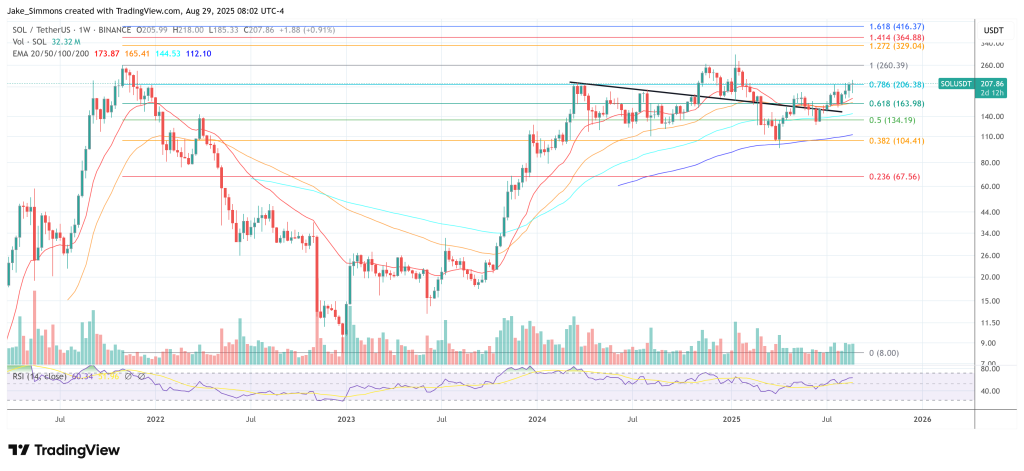Solana’s Rust validator client Agave has matched Firedancer’s lab record, briefly peaking at 1.1 million transactions per second in a synthetic, single-node benchmark. The result was disclosed by Solana core engineer Andrew Fitzgerald, who wrote: “Hit a burst of 1.1m TPS on agave this morning. Single-node synthetic test with simple transfers. On a branch with several changes not yet merged,” before listing PoH recording and status-cache improvements alongside new “scheduler-bindings,” with block/shred limits disabled for the run.
Pressed on caveats, Fitzgerald added a plain-English qualifier: “disabled block/shred limits, and it’s a burst not sustained. have several long-term perf improvements squashed on top of scheduler-bindings to make this happen.” The exchange underscored that this is a laboratory datapoint, not a network-wide throughput number.
Solana’s Core Client Smashes 1.1M TPS
The milestone immediately fed a broader narrative about client-level competition on Solana. Helius co-founder Mert Mumtaz framed it this way: “last year Firedancer hit 1.1M TPS on a synthetic test — now, Agave has done the same. There is an outdated notion that Solana will become faster only if Firedancer. This is from a time when Agave wasn’t as competitive — but it is now. The competition between the two client teams will improve the chain like never before.”
Anatoly Yakovenko, Solana’s co-founder, poked fun at the victory lap, quipping: “Pls no more. Just ship ag and lower the timers to 150ms.” The remark tracks with the network’s ongoing push to reduce consensus latencies. That push is currently crystallized in SIMD-0326 (“Alpenglow”), a consensus overhaul now in community voting that targets ~150 ms block finality by reworking how and where validator votes occur.
Under the hood, the Agave test hints at where performance headroom is being unlocked. “Scheduler-bindings” — a forthcoming extension that lets validators plug in custom block-packing logic without forking core — has been on Anza’s public roadmap since May. Recent Agave 2.3 literature also details a revamped TPU client (“tpu-client-next”), AccountsDB I/O reductions, a greedy scheduler, and snapshot/gossip improvements, all of which cut real-world overhead even if they don’t show up in synthetic peaks one-for-one.
The obvious question is what the 1.1M TPS burst actually means for users. Synthetic single-node tests measure raw execution and scheduling throughput with some guardrails temporarily lifted; they do not translate linearly to mainnet capacity, which is bounded by network propagation, signature verification, scheduler policy, and economic constraints. Still, the number is directionally consistent with the network’s trajectory. Earlier this month, independent experiments observed six-figure TPS bursts on mainnet under heavy program-call load — a separate datapoint that, taken together with Agave’s lab figure, reinforces the pace of optimization across both client and protocol layers.
Two broader takeaways stand out. First, Solana’s client diversity is no longer hypothetical: Agave (Anza) and Firedancer (Jump Crypto) are now trading blows on the same synthetic leaderboard, with different codebases stressing different parts of the system — a healthy sign for resilience and future performance. Second, the product focus has shifted from trophy numbers to latency and predictability: the 150 ms target, if adopted, compresses user-perceived finality in ways that matter for payments, trading, and real-time apps even when headline TPS fluctuates.
At press time, SOL traded at $207.86.

from Bitcoinist.com https://ift.tt/IZDc1Qb
Comments
Post a Comment